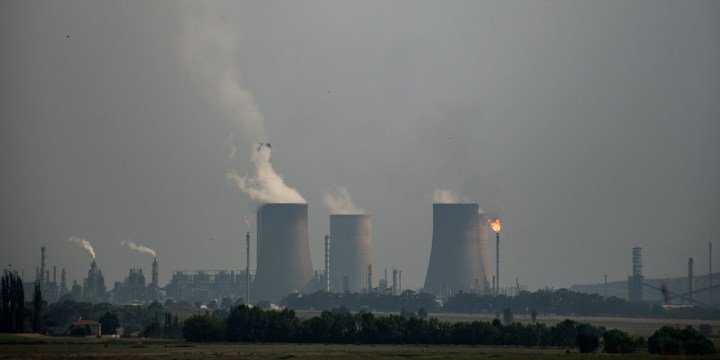CLEAN ENERGY
‘There’s no belief people will benefit’ — Mpumalanga mining communities’ deep mistrust of just transition

The Presidential Climate Commission has been hosting consultations with communities in Mpumalanga about the country’s transition to low-carbon energy. But no one from Eskom or national and local government has pitched up at the meetings, leaving residents sceptical.
‘We are tired. We are gatvol,” said Rosena Ntshweni from Womxndla Community Development NPC at a community consultation held by the Presidential Climate Commission (PCC) in Secunda, Mpumalanga, on Tuesday, 11 October.
The consultations in Emalahleni Local Municipality and Govan Mbeki Local Municipality this week were held to discuss South Africa’s implementation of a just transition framework to a low-carbon economy, which was approved by the Cabinet in May.

The framework outlines how South Africa could progress towards the national goal of reaching climate resiliency and net zero carbon emissions by 2050 without leaving behind the towns built around coal mining and the people who have historically relied on it.
Read more in Daily Maverick: “Getting buy-in from the people most at risk in SA’s just transition to low-carbon energy — the workers”
After multiple consultations with communities in KwaZulu-Natal, Eastern Cape, Northern Cape, Limpopo and Mpumalanga, the PCC was “still getting a sense that there is lack of trust”, Blessing Manale, head of communications and outreach at the PCC, told Our Burning Planet.
Jobs vs lives
“There’s no belief that people will benefit. There is quite a tension between workers and communities because there are people that are beginning to say, ‘No, we’re losing jobs’. But the communities are saying, ‘No, we are losing lives’.”
Coal mining has serious impacts on people’s health, with people affected by contaminated water and by air pollution.
People are not only concerned about those who work at mines and energy plants, but the effects on the downstream economy.
“I give the typical example of the lady who cooks pap and vleis,” said Manale. “An engineer in a solar plant might not want to eat pap and vleis and might just be spending an hour on the site and leaving, unlike a [coal] miner, who works eight hours a day.”
Manale said the purpose of the PCC’s consultations was to create an implementation plan and explore economic diversification, such as downstream beneficiation that could result from renewable technology.
“We depend mostly on mining,” said Bongekile Zwane, who has lived in Carolina her whole life. “It’s where we hope to find jobs, better jobs, better-paying jobs. And if it’s not the government sector, then it’s the mine for us.”
Our Burning Planet recently reported that Mineral Resources and Energy Minister Gwede Mantashe told an energy summit that if South Africa was to close down the coal sector, it would create 10 ghost towns ‘overnight’.
Witbank ‘already a ghost town’
“But we want to say to Mantashe, Witbank is already a ghost town! You have not been there,” said Manale, whose father died of tuberculosis after spending his life working at Sasol’s plant in Secunda.
Mandy Rambharos, who was head of Eskom’s Just Energy Transition Office at the time, responded that coal was not the only resource Mpumalanga could benefit from. The province has rich solar and wind resources vital to South Africa’s energy transition and to stimulate the economy and provide jobs.
The official unemployment rate for the province is 38%, with 58% youth unemployment, and 66% of women affected by unemployment.
Read more in Daily Maverick: “Shut-down Komati power station first of its kind to be repurposed into renewable energy training facility”
Ntshweni says her frustration and mistrust stem from how the municipality has dealt with the area’s decade-long water issues, the gender-based violence that is often linked to contractors working on the mines, the ripping up of multigenerational community vegetable gardens to lay sewerage works, and from feeling “constantly ignored”.
“I’m still angry,” said Ntshweni, who said that she has never drunk clean water in the 20 years she has lived in Carolina.
Ntshweni said the town is surrounded by 12 opencast mines that contaminate the air. It also has two open-pit mines that she says have not been rehabilitated or safely closed.
African Business reported that heavy rainfall in January 2012 led to the collapse of the town’s water system. “Scores of residents fell ill, and local authorities were slow to tell them the water was unsafe to drink.”
Pollution and contamination
A 2013 research paper by Wits University investigated the Boesmanspruit Dam which is supposed to supply Carolina with potable water. It became contaminated in 2012. The researchers found that pollution of the dam originated from the Witrandspruit sub-catchment, where seepage from coal mines had accumulated in a wetland upstream of the dam.
The study reported: “During an unusually heavy downpour, ponds holding polluted run-off from coal handling facilities overtopped and flushed the contents of the wetland into the Boesmanspruit Dam.”
Ntshweni said Carolina’s underground water was contaminated by the chemicals from the dynamite used in mining processes.
“It’s a community that is mostly affected by mining,” said Zwane, explaining that many people, including children, have tuberculosis. She said she had contracted a skin rash from the contaminated water.
African Business reported that after a high court ruling in 2012 called on the government to address the acid mine drainage crisis, Carolina’s municipality had fixed the town’s water infrastructure. “However, this did not address the problem at its root: instead, it only deferred it until the next time there was torrential rain.”
Zwane said the water issue was ongoing. After protests last year, the municipality launched an investigation.
“After the water came back, we used it … and that’s when the breakouts started. We got sick. I personally have a skin problem right now … because of the water,” said Zwane.
Restoration and regeneration
The just transition programme is meant to include the proper rehabilitation of coal mines as well as restoration and regeneration of the environment.
Community members were upset that there was not a proper representative from the Department of Mineral Resources and Energy (DMRE) in attendance at the consultations.
In terms of the proposed reskilling programmes, community members said they were worried that it would not be possible for everyone to be reskilled as many had different experiences and education. Some people had a Grade 8 education, but 10 years’ experience in coal, for example, whereas others had matric, but no experience in coal.
Ntshweni and Zwane were particularly concerned that women should be included in the reskilling programmes. Women have historically been excluded from jobs in the mining sector, with some resorting to sex work.
During the PCC’s engagement meetings in Gqeberha in the Eastern Cape two weeks ago, Manale said there were strong arguments made for community-owned water schemes. In Mpumalanga, there was a strong demand for community-owned renewable energy projects.
Key stakeholders missing
The PCC’s consultations were meant to include stakeholders from national and local government and Eskom. But despite being invited, these stakeholders did not pitch up.
“We remain worried as the PCC about the participation of government departments,” said Manale, adding that they had discussed this issue with the ministries, particularly because communities were raising matters that were not the responsibility of the PCC.
“It shows you that these people are missing and they’ve been missing even before the PCC [was formed],” said Manale.
A written invitation was extended to the district mayor and district municipal manager of Govan Mbeki Local Municipality, but they did not attend the meeting.
Although a representative from Emalahleni Local Municipality attended the consultation in Emalahleni on Wednesday, 12 October, there was no one from Steve Tshwete Local Municipality. The Komati Power Station is situated in Steve Tshwete Local Municipality.
Visit Daily Maverick’s home page for more news, analysis and investigations
The DMRE, which is on the PCC’s committee, was invited, but it sent a representative who was unable to address community members’ concerns as he was from “the wrong section in the district development model”. Manale said they had needed somebody from enforcement and rehabilitation, and from Eskom’s Just Energy Office.
The Department of Forestries, Fisheries and Environment (DFFE) was also invited, but did not send a representative.
Manale said Eskom had excused itself, saying representatives were tied up at consultations in the Free State.
The DMRE had not responded to a query from Our Burning Planet by the time of publication. The DFFE and the Department of Water and Sanitation said they did not have a record of being invited to the meeting. (It should be noted that ministers of both departments are part of the PCC Committee and thus aware of all PCC engagements.)
The PPC said it would be taking the issues raised by communities to the ministries, but it was concerned that no one would answer their questions.
Manale said the consultations would inform the implementation of the framework, which is to be tabled by April 2023. OBP/DM






















 Become an Insider
Become an Insider
I am not surprised that the representatives from the National-, Provincial- and Local governments have not attended the meeting. They are too busy dishing out mining licenses in one of the most important food production areas of South Africa. Anyone who has driven through Hendrina, Carolina, Bethal and along the N11 and R38 will tell you that these towns have turned into dirty, illegal coal truck-stops. The fine black coal dust permeates everything, and the roads that are not constructed to carry these loads, are destroyed. The citizens of South Africa must take a stand against the issuing of coal licenses because most of the coal is exported. Mining companies are paying farmers up to R100,000.00 per hectare to mine and profit is the biggest motivator – not electricity for all. People living in cities far away from these towns flip a switch without realising the cost to other communities. It is time for South Africans to consider the long term implications of extracting coal. Once the coal has been extracted, what will be left? Unproductive soil leading to food shortages, contaminated water, destroyed road infrastructure and more unemployment. Moving to alternative environmentally friendly energy sources is the rational thing to do. Every South African should have access to electricity, but it should be clean and renewable. We don’t have any time left to take action. Citizens must take responsibility for their future and drive this crisis.